
In Seclusion Smörgåsbord II, I continue my chronicle of viewing taped and live streamed theatrical presentations viewed from the seat of my couch.
Culture Clash (Still) in America (Berkeley Rep)
This troupe has been performing for decades. In 2002, they had a program called Culture Clash in AmeriCCa based on interviews they conducted. Culture Clash (Still) in America is an update with some added scenes reflective of current events. The tone is incisive satire through broadly comedic skits as filtered through a Latino lens. Richard Montoya, Ricardo Salinas and Herbert Següenza are all accomplished actors. Here they showcase a wide range of skillful characterizations.
The show opens at an ICE Detention Facility where a man is being detained. We learn that he has been separated from his daughter. The initial tone is heavy but quickly turns to a documentary style with laughs between the two agents and the prisoner. The people we then meet include a Miami couple in the demolition business who are being interviewed on camera. They are hilarious as they over talk each other while baring their societal prejudices and penchant for greed. Hurricanes are good times for the demolition business.
The parade of stereotypes include a black pastor who wonders, “How did Jesus go from looking like Osama bin Laden to Brad Pitt?” He concludes that “white Jesus was a lie, the original fake news.” Junior is a Nuyorican who demonstrates through dance how to tell various shades of brown-skinned people apart. There’s also a Cuban transvestitie, two men (African, Filipino) swearing in to become citizens and a couple of ex-hippie pot smoking lesbian ladies from Fresno, California. The jokes in this section are plentiful. Giving granddaughter a woke Barbie. Romancing youthful revolution: “I stood for Che Guevara and Chez Panisse.”
One of the ladies says to the other, “careful honey, you’re appropriating.” It certainly is possible that people may view sections of this satire in that vein. What binds this particular piece together, however, is the follow up story to the original ICE detention center. A lawyer who works on family separations is interviewed. The story links back to the opening scene. He asks the unanswerable about a “country that separates children” and cages them “as punitive measures.” The dagger is then thrust: “Can that country still be called America?”
Performances of Culture Clash (Still) in America were interrupted by the pandemic. This Berkeley Repertory Theater production was sharply directed by Lisa Peterson with a skillful set design by Christopher Acebo.
Bindlestiff Open Stage Variety Show: Quarantine Edition
My first visit to this monthly inclusive hodgepodge of circus acts and bizarre curiosities was back in December, 2018. Given our stay at home situation, these performers have taken to the internet to share their talents remotely. Keith Nelson is once again the host who performs some of his classics between acts including the spinning top and sword swallowing. The broadcast is also a fundraiser for these artists during this difficult time.
The acts are often experimental, in development or simply just odd. Others are impressively professional and, like the best circus acts, fill the viewer with wonderment. Michael Rosman welcomes us to his driveway in the “deep woods of Maryland.” He created a new quarantined tightrope act which has been “planned but not well thought out.” He literally and figuratively performs a tightrope walking routine above two tigers and a flaming pit of fire.
Nelson Lugo impressed with an entertaining version of the shell game. Butch and Buttercup performed their amusing lift and balance gymnastics from an empty Brooklyn warehouse. The heavy metal musician character embodied by Brian Bielemeier rocked the silver rings. He dedicated the show to his six ex-wives.
There are other fine acts within this nearly two hour live stream. Naturally there are some technical mishaps and juggling calamities along the way. The first act presented was Magic Mike. Think a very, very, very aged version of the Channing Tatum movie persona who presents ridiculous comedic mishaps from his home with no pants on.
Zeroboy is somewhat of a sound effects master. This act was all over the place. When he started singing Peggy Lee’s “Fever,” a line followed: “you gave me COVID…” One of our housebound family members announced, “I’m out.” This “quarantainment” is definitely (and intentionally) a mixed bag but can be an amusing diversion during happy hour. They are planning to air this series weekly to enable these performers to continue creating their art and, hopefully, collect a few donations as well.
Bindlestiff Open Stage Variety Show: Quarantine Edition is available on the Bindlestiff Family Cirkus Facebook home page and their You Tube channel.


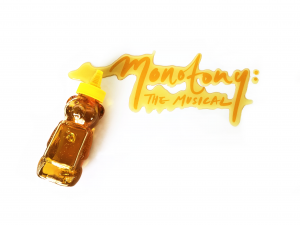
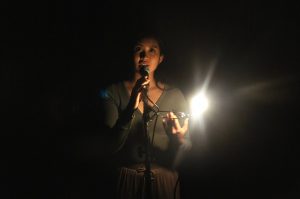
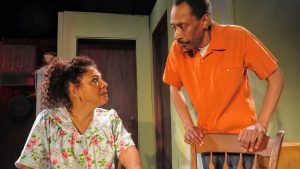
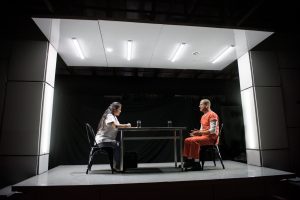
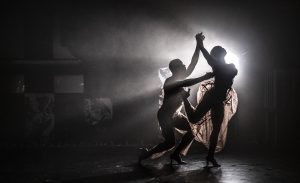
You must be logged in to post a comment.